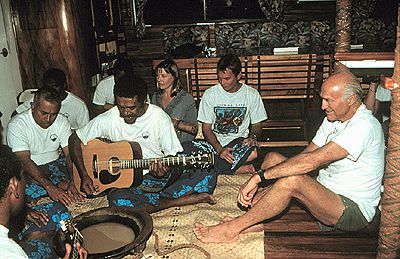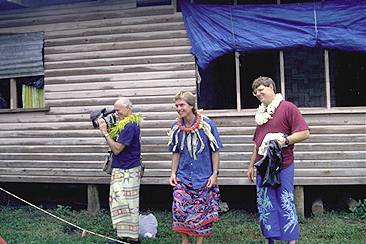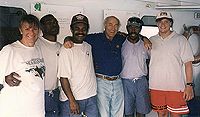Excerpts from a Letter by Stan to his Wife aboard the NAI'A off the Island of Gau
November 8, 1995
Dear Susz,
Fiji has turned out to be a most pleasant surprise. The diving is terrific! The boat is comfortable and well-run. The owner and head of the diving, Rob Barrel, is a Harvard man, who dropped out in his second year to sail around the world. He has never stopped sailing and is a master mariner with a classic education and a splendid sense of humor. We get on famously. I have a roomy cabin with a bunk mate who doesn't snore. As usual on first class live-aboards, the food is excellent and abundant and the crew wonderfully cheerful and helpful. I am embarrassed to tell people that I earn my living by hosting these tours.
The guests are a pleasant, intelligent bunch, all gung-ho divers and good company...........no bad apples. There's lots of macro, which I love and that had never been associated with Fiji in what I had read about diving in these islands. Rob Barrel is also much interested in macro. We have the same cameras; so diving with him is wonderfully productive. The Fijian dive master also has a keen eye for macro. Between the two and their familiarity with the small, exotic marine animals, I have been able to focus on more leaf fish, pipe fish and weird nudibranchs than I can recall harvesting in one dive trip. Thank Poseidon for good shooting, good people, good bunk, good food and a well-run ship. This is a ten-day tour, a long time in my book, and the time is passing well.
There's one negative. I misjudged the water temperature here and didn't bring a heavy enough wet suit. So I get cold every dive and know that I am going to get cold each time I prepare to go in, which is four times a day. One associates Fiji with the tropics, and - indeed - the land is tropical. But the water is colder than the Caribbean. Next time I will bring a full half inch wet suit.
I am sure you've heard of kava. It's the native drink here in Fiji. In the villages it is made by women chewing the kava root and spitting the juice into a bowl for the men to drink. Here on the boat they have dispensed with the spitting. The juice is rendered by squeezing the root in a twisted cloth. The product looks like muddy water and is just about as intoxicating. Almost every evening some of the crew put down a mat in the camera room and take up guitars, ukes, and some funny little percussion things. They sit cross-legged with the kava bowl, a beautiful wooden bowl, between them. They sing with rough harmony, wonderfully compelling and evocative of the singing we knew in the islands. Guests are welcome to sit in. Only a few do. Most have turned in shortly after dinner (about 9), including this old man. However, I've sat in twice. The kava is passed around every second or third song. A coconut shell is dipped into the bowl. The ritual requires that you clap once, drain the miserable brew in one long swallow, after which all assembled clap. It's companionable. The crew are pleased to have you join them. The honor was certainly mine. Whether or not any one joins them, they sing and play for their own pleasure. They are a smiling, out-going people of good stature and great dignity. Historically, the men were fierce fighters and descend from cannibal ancestors.
Two nights later we had the big "Entertainment Evening": a mat was spread out in the mid-ships dive locker section. All the crew assembled, including the captain, Carol, a lady master who has sailed around the world and now lives in Fiji with her husband. There were three guitars, two ukes, a bongo drum and a bamboo tube with beans sealed in it, a sort of marimba. The kava bowl was centered before the musicians. Two coconut shell cups were repeatedly dipped into the kava bowl and passed to the guests, who drained each offering, accompanied by claps and cheers. The wood bowl was replenished from a plastic bucket, the supply of kava obviously being inexhaustible. The singing and drinking went on past midnight, the lustiness of the voices and the pleasure the crew took in their singing undiminished. The kava is so mild that it must take a lot to create any degree of intoxication.
However, the guests loosened up and enjoyed themselves enormously. At one point, around 9:30, Carol announced that the traditional farewell song would be sung, after which those who wished to retire might do so without rudeness. The song, rendered without instruments, the harmony more practiced, was haunting, deeply touching. It reminded me of the farewell song always played at the airport in Papeete at time of departure.
I turned in. At midnight I got up to take a pee. The voices and laughter were still strong from above.
Sawaieke Village on the Island of Gau: We visit the village off which is the shark pass. It is by their permission that we are allowed to dive in their territory. This is Rusi's village. Rob had a long briefing about their customs and what we may do and not do. We may not wear hats or sun glasses while in the village. They -- the villagers -- genuinely enjoy the visits that come about twice a month and honor the guests with a kava ceremony in their great house. They do not market a product or treat the visit as a commercial enterprise. Their hospitality is genuine. They enjoy the kava ritual. The visit by the Nai'a guests twice a month pleases them. An in that true reciprocal pleasure lies the sense of warm hospitality. It is almost totally unique in my experience with village visits from live-aboard dive boats.
We wore our lava lavas. Women and children were at the sea wall with frangipani leis for each of us. Behind is the village, which is situated on a flat greensward, shaded with splendid great shade trees, the houses neatly kept under them. The grass was short cropped - very creditable lawns. From the doorways children peeked shyly and women smiled and waved. Behind the village rose the dark green foothills, sloping with gentle, rounded curves to the higher, steeper slopes. Light green patches marked areas where their fires had swept the hillsides. Black patches had recently been burned and cleared for cultivation.
We were led through the village by ladies and children. This is a Methodist village with a population of about 300. As we passed behind one of the houses an elderly gentleman with a fine head of white hair was having it barbered by a lady. We were told that he was the chief. He waved and called a greeting to us.
At the outset I thought this village just about the most ordered with the most congenial people I had encountered in the Western Pacific. We were expected in the Community House, a long building with matting on the floor and tapa cloth curtains. No doubt this might have been the Men's House before the Methodist influence brought the women out of "purdah".
A magnificent kava bowl was set in front of what appeared to be most of the village. We left our foot wear on the porch and took up a half circle on the other side of the kava bowl and facing the villagers. First their official greeter, a dignified elder, welcomed us with an address that might have competed in length with Castro's speeches. Our own spokesman, Rusi, delivered a speech of equal length, to which the villagers listened with full attention. He was obviously respected and spoke well. The speeches being delivered were, of course, in Fijian. For all we knew they might be sizing us up for the cook pot.
By tradition a gift is brought to the house that one visits. The gift is usually a bundle of kava roots, ready for pounding or squeezing. This time the bundle was bound with golden ribbon and looked like a sheaf of wheat. The bundle, I am told is worth $20. On this occasion, and to emphasize their pleasure in our visit, the old gentlemen presented Rusi with an almost identical bundle of kava.
These introductory formalities over the rites observed, the kava was passed around. Women and some young children mixed with the men, all sitting in no particular order on the mats. The musicians are six men with guitars and ukes, gathered behind the kava bowl and knocked off a couple of tunes. Then the floor show arrived. Two men, both big, hirsute fellows, sprang into place in the space before us, greeted with laughter and claps from the villagers. They were bedecked with straw and stems, like camouflaged warriors. They did a wild, well-choreographed dance, filled with symbolism and obvious raunchy innuendo that provoked laughter and encouragement from the assembly.
When the show was finished, the kava was again passed around, the music started up and the ladies swooped down upon us. It was time for us to dance. Rob was grabbed by one of the ample matrons and showed us the "Fiji Hop". Side-by-side with our partner, arms around waists, you take five steps forward, then five steps back. Even the most inept dancer with a tin ear can do it. Men from the village ranks invited our ladies to the dance. Soon the floor was bouncing with the couples, then two and three couples linked up and doing circles. My partner led me back through the sitting throng to an opening in the middle of the seated villagers; and there my sarong came undone and fell off. This, of course caused great mirth and cheering (which they do by clapping). My partner showed me how to fix the garment more securely and we took off again, forward backward, laughing and enjoying ourselves.
I suppose that if we had been whalers a century and a half ago we would have left the village in a hale of native spears, perhaps carrying some of the wahines over our shoulders. Our departure on this visit was filled with joy and laughter. One of our guests had foresightedly brought along a bag full of gaily-colored, blow-up beach balls. As we exited the community house we blew up the beach-balls, distributed them to the children and played catch with them all the way back to the boats.
I should like to return to that village and will. The establishing of friendship on that first, brief visit had more meaning and value than I have ever know. I wasn't really prepared to shoot a finished video piece, but will be on the next round, which will be May of 1996.
End of trip, a whole day to spend here in Nadi before catching the 11:55 PM flight home. A couple and I were sharing the cost of a day room at an inn near the airport. It's a good time to do my homework and finish this letter to you.
I am glad to be going home. My anchor to windward is you and our family. You said it all in your well-spoken, on camera parts in "The Man Who Loves Sharks" it is the family that keeps up together.




